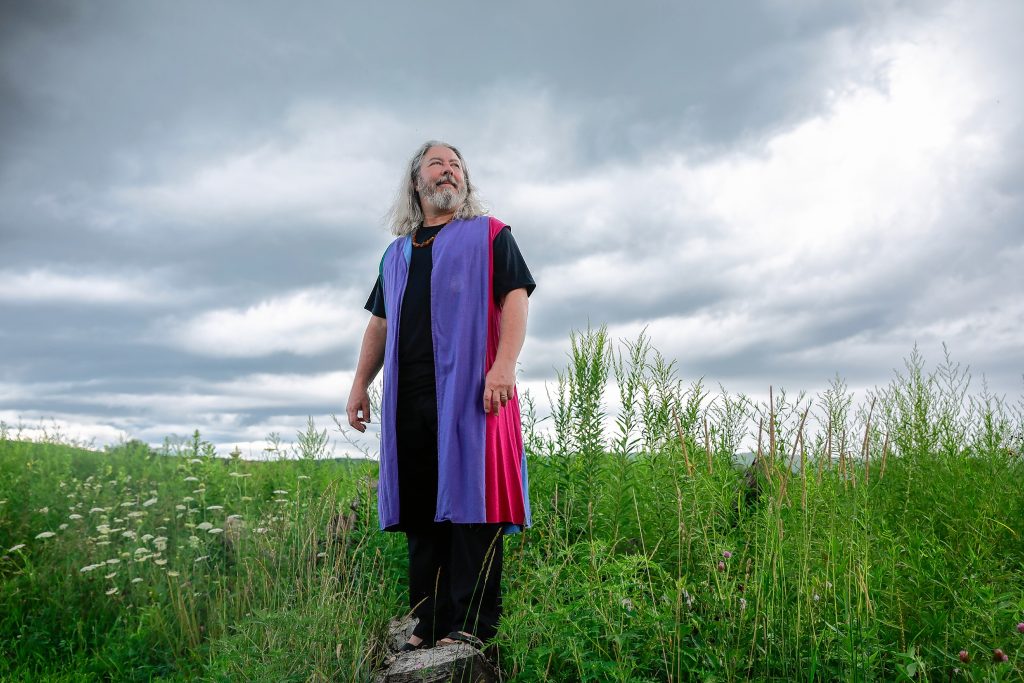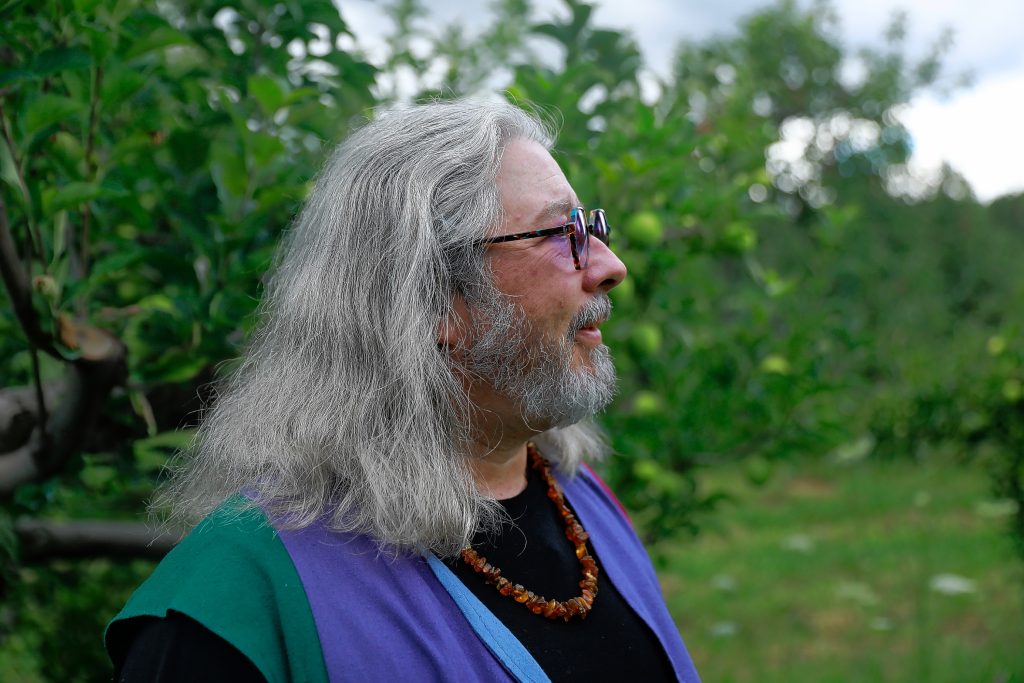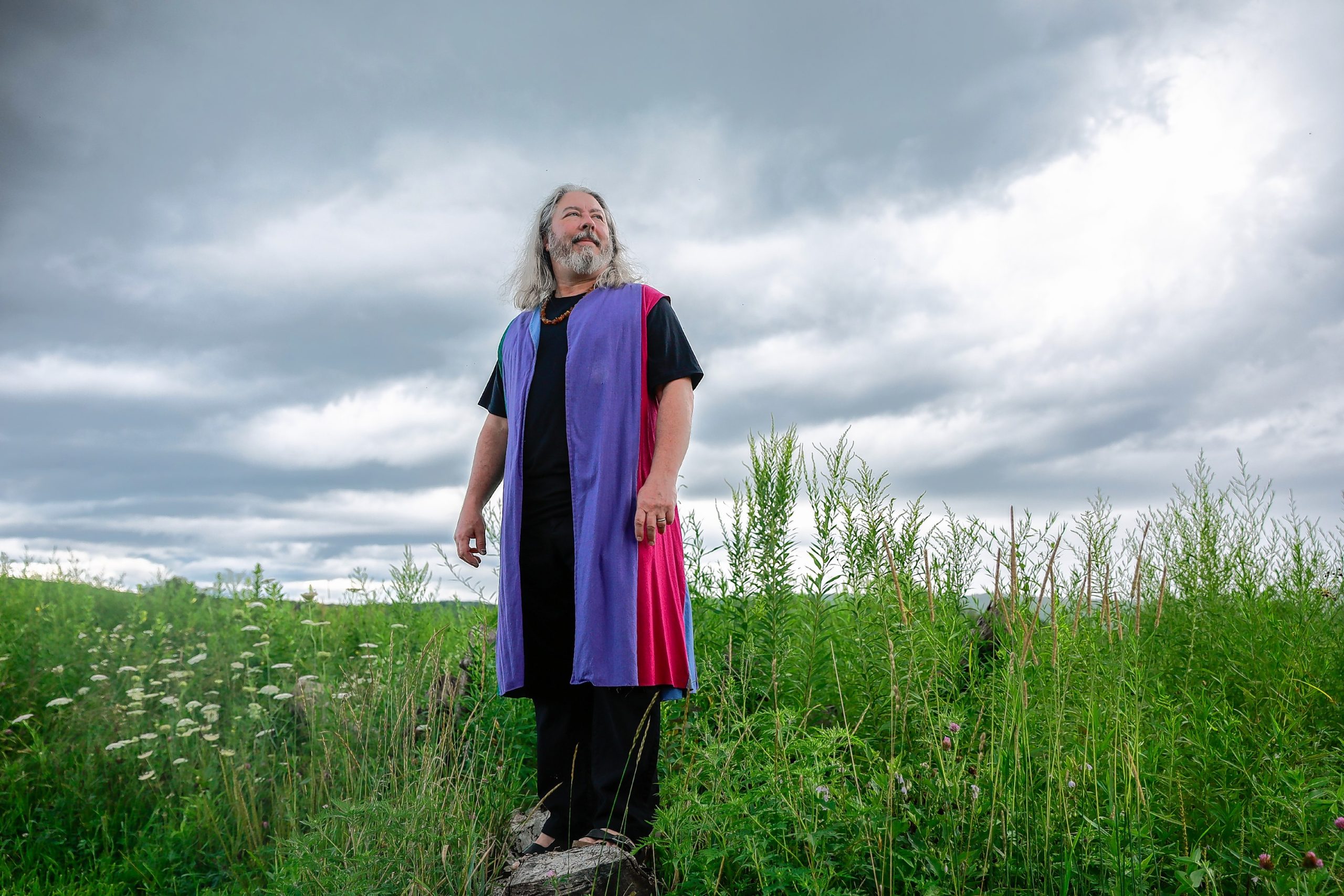By EMILY THURLOW
For the Advocate
At one point or another, you’ve likely overheard someone mention “Pagans” in a conversation. Those not in the know might feel an immediate sense of skepticism upon hearing the word. It might even elicit fear for some who link Paganism to satanism or worship of the devil.
However, it might not mean what you think it means.
“Pagans don’t believe in a Satan or a singular devil kind of character like that. The devil, Satan, is a part of a Christian worldview,” said Rev. Christopher LaFond, who is an ordained Pagan clergy member and on the board of directors for EarthSpirit Community, a Pagan, educational and cultural community based in western Massachusetts.
LaFond hopes to dispel other misconceptions and to further shed light on the Earth-based spirituality at this year’s Western Massachusetts Pagan Pride Day event in Northampton on Sept. 23.
Now in its 24th year, the nonprofit organization strives to establish awareness of Earth-centered spiritual traditions. The event is part of a national Pagan Pride Project to help foster pride in the Pagan identity through education, community and activism as well as charitable efforts.
What is Paganism?
Trying to condense the definition of Paganism into one sentence can prove to be challenging.
Andras Corban-Arthen, founder and spiritual director of the EarthSpirit Community, said Paganism encompasses a very wide variety of chronological, geographic, cultural and spiritual scope.
“It’s one of those words that has come to acquire so many meanings, and they don’t always agree with each other,” said Corban-Arthen.
As such, he says that no single individual or organization can represent the views of all Pagans.
From Corban-Arthen’s perspective — as well as various members within the EarthSpirit Community — Paganism is a collective term that refers to the Indigenous, pre-Christian cultures and spiritual traditions of Europe, some of which survived into present-day, while others have been modified to meet modern times.
Pagan comes from the Latin word, “Paganus, Pagani,” which generally meant “people of the land” or “people of the earth.”
Corban-Arthen says that the Romans added to it the pejorative sense of “bumpkin” or “simpleton” which urban peoples have often characterized those who are rural and uncivilized.
He said that the term went on to carry negative connotations when Christianity began to spread beyond the Roman Empire. At that point, Paganism was equated to godlessness and that was then applied to define all peoples outside of Abrahamic religions.
Corban-Arthen feels that the bleak implications were the product of old “classist, cultural and religious prejudices,” which the EarthSpirit Community rejects.
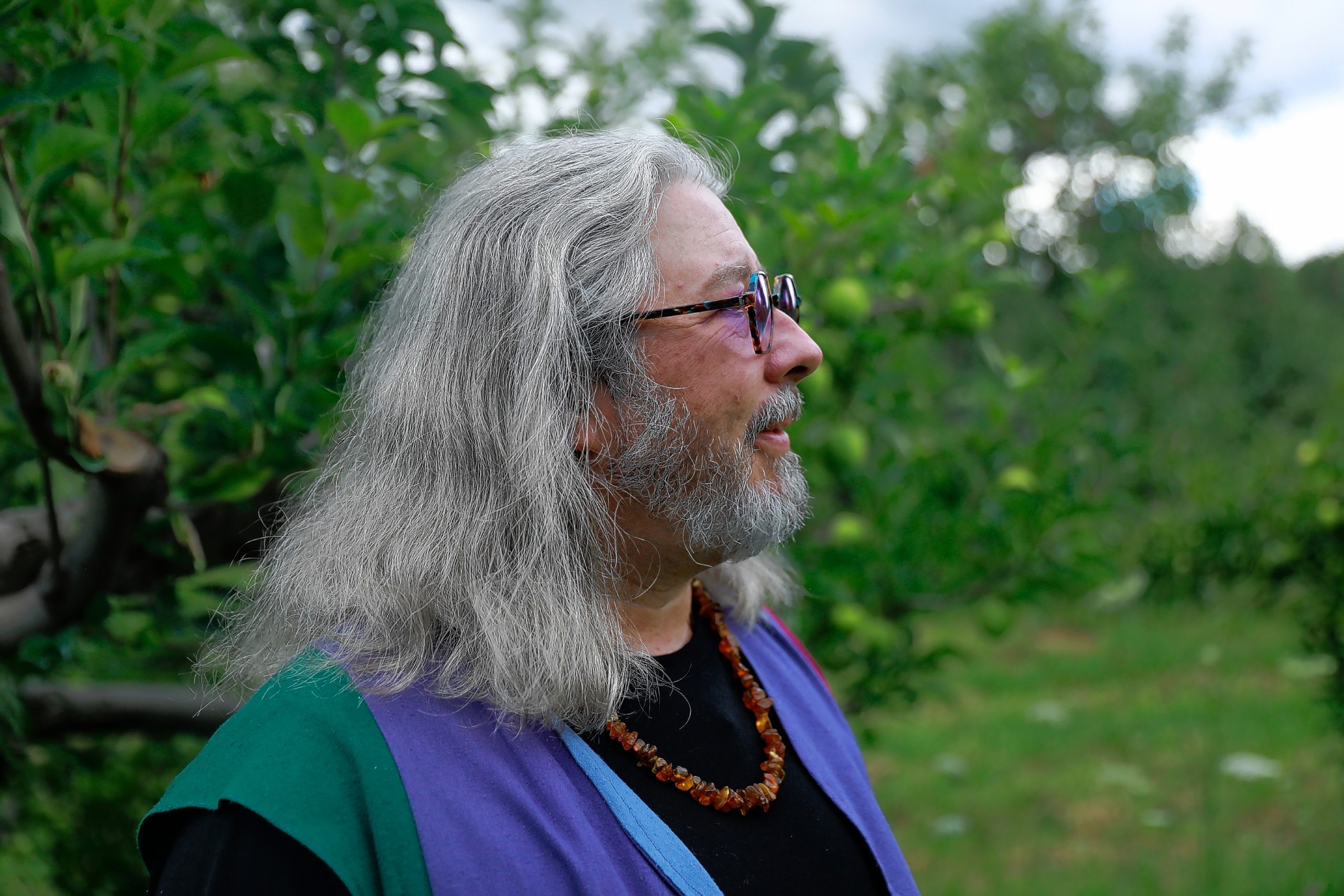
Rev. Christopher LaFond poses for a photo Tuesday afternoon among apple trees in Westhampton. STAFF PHOTO/DAN LITTLE
One definition does not fit all
LaFond, a resident of Westhampton, said that because the term Paganism is used so broadly, it includes numerous traditions, many of which are inspired by ancestral traditions, including polytheists, practitioners of Hellenistic traditions characterized by reverence of the gods of the Hellenic world, and animists, who believe that all things possess a spiritual essence.
He notes that these ancient traditions also have a lot in common with other Indigenous traditions, such as heathens, a polytheistic religion which recognizes multiple gods and spiritual entities, and non-European Indigenous traditions such as Hinduism, which has monotheistic and polytheistic elements.
One aspect that most share is a veneration of the Earth as being sacred.
“Despite similarities in belief or practices, some people who practice these traditions do not identify as Pagan,” said LaFond. “There is no one set of beliefs that defines Paganism. We like to joke about asking 10 Pagans a question and you’ll get 15 different answers.”
There are a number of groups within the umbrella of Paganism who have different traditions and different focuses in their spirituality, such as druids and witches.
According to Corban-Arthen, generally speaking, there are basically three forms of Paganism: traditional, reconstructionist and neoPaganism.
Traditional Paganism represents the survival of cultural practices in cultures such as the Celts and the Balts.
“You tend to find those mostly in remote isolated places in various parts of Europe,” he said.
Corban-Arthen said that reconstructionist Pagans are modern people who are looking at old traditions. Oftentimes, they engage in research, travel to locations and learn languages and try to reconstruct what existed thousands of years ago into modern times.
NeoPaganism, which represents the largest segment of the population, is arriving at spirituality from a modern perspective. One of the largest and fastest-growing of that subset are those who identify as Wiccan, a form of religious witchcraft.
A spiritual journey
A native of Spain, Corban-Arthen was raised with Catholicism, but decided to part ways from the religion because the idea of worshiping supernatural beings didn’t sit well with him.
Corban-Arthen, who also serves as president of the European Congress of Ethnic Religions in Lithuania and as a member of the advisory board of the Ecospirituality Foundation, a United Nations Consultative non-governmental organization in Italy, found Paganism when he moved to Boston in the late 1960s. There he met his spiritual teachers who shared how they saw the world and how they practiced their spirituality. Originally from Scotland, their spirituality was focused on living in harmony with the natural world and being in community and honoring the power of wilderness, he said.
He also noted that they thought of themselves as animists and didn’t worship an anthropomorphic deity in the way that Christians do.
“That attracted me in a way that nothing else had,” said Corban-Arthen. “They had more of a sense that what people would call God is really more of a force in energy, if you will, that was impersonal in the sense that it had no personal form as a person or human being. Rather, it permeated all of nature … The same stuff that humans are made of is the same stuff that animals, plants and rocks are made of. We’re all part of the being that we call earth.”
To him, this approach felt like a more direct way to “experience the sacred” and to have it in many ways be present in every aspect of life.
These days, Corban-Arthen says what he practices now is essentially the same as what he was taught.
In 1977, he founded the EarthSpirit Community as a nonprofit organization with the goals of helping to create an active Pagan community in New England.
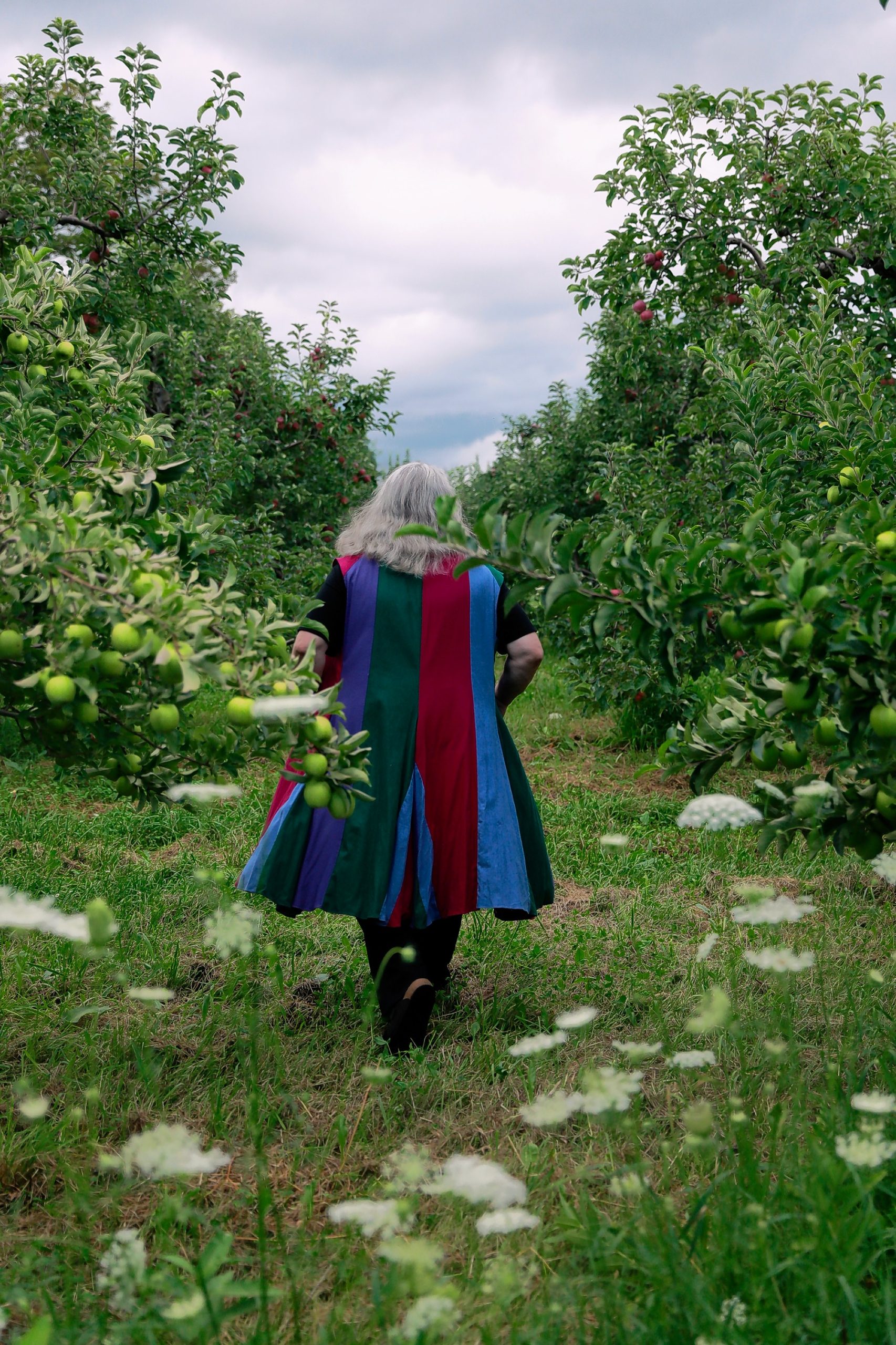
Rev. Christopher LaFond poses for a photo Tuesday afternoon among apple trees in Westhampton. STAFF PHOTO/DAN LITTLE
Overcoming prejudice
While living just outside of Boston, Corban-Arthen said he and fellow members of the EarthSpirit community would go to Middlesex Fells Reservation, a 2,200-acre state public recreation area, to perform ceremonies and rituals and would inevitably find themselves on the receiving end of harassment.
“They’d either start intruding or not be mindful of the fact that there was a ceremony going on … or they would start yelling at us or what have you,” he said.
Collectively, the group made a decision to move out west to set up permanent headquarters that would allow everyone to feel safe, which led to the establishment of a 130-acre pagan sanctuary and nature preserve in Berkshire County.
While there has been much more acceptance in recent years, Pagans still experience prejudice in the Bay State, says Rev. Katie LaFond, who is married to Christopher LaFond and also serves on the board of directors at EarthSpirit. Some Pagans tend to keep their spirituality very private out of fear for their safety, she said.
“There’s a lot of teachers who are afraid to talk about it because they’re afraid of what the public will say or that their job will be threatened,” she said.
Corban-Arthen added that not so long ago, discrimination against Pagans could lead to people losing their jobs, not being rented a property, and even parents losing custody of their children in divorce proceedings.
Taking pride in Paganism
Before embracing Paganism, Christopher LaFond grew up in a Christian household with a father who was a deacon at the Catholic church they attended. He also spent three years in a Catholic seminary studying to be a priest. After a few years of volunteering and connecting with Indigenous people from the highlands of Ecuador, he came back to Massachusetts in the early 1990s in search of that kind of spirituality.
LaFond, who is a pagan animist and a master astrologer in the Society of Astrologers, joined the EarthSpirit Community in the mid-1990s.
For the past decade, he has served as the local coordinator for Western Massachusetts Pagan Pride Day, which is entering its 24th year.
Each year during the weeks surrounding the autumnal equinox, Pagan Pride events take place all over the world, including the western Massachusetts chapter as well as one in southern Massachusetts. Each celebration includes a public gathering where Pagans can network with each other and celebrate an autumnal equinox ritual, participate in a food drive or other charitable activity, and some form of press coverage to bring awareness to the public about Paganism.
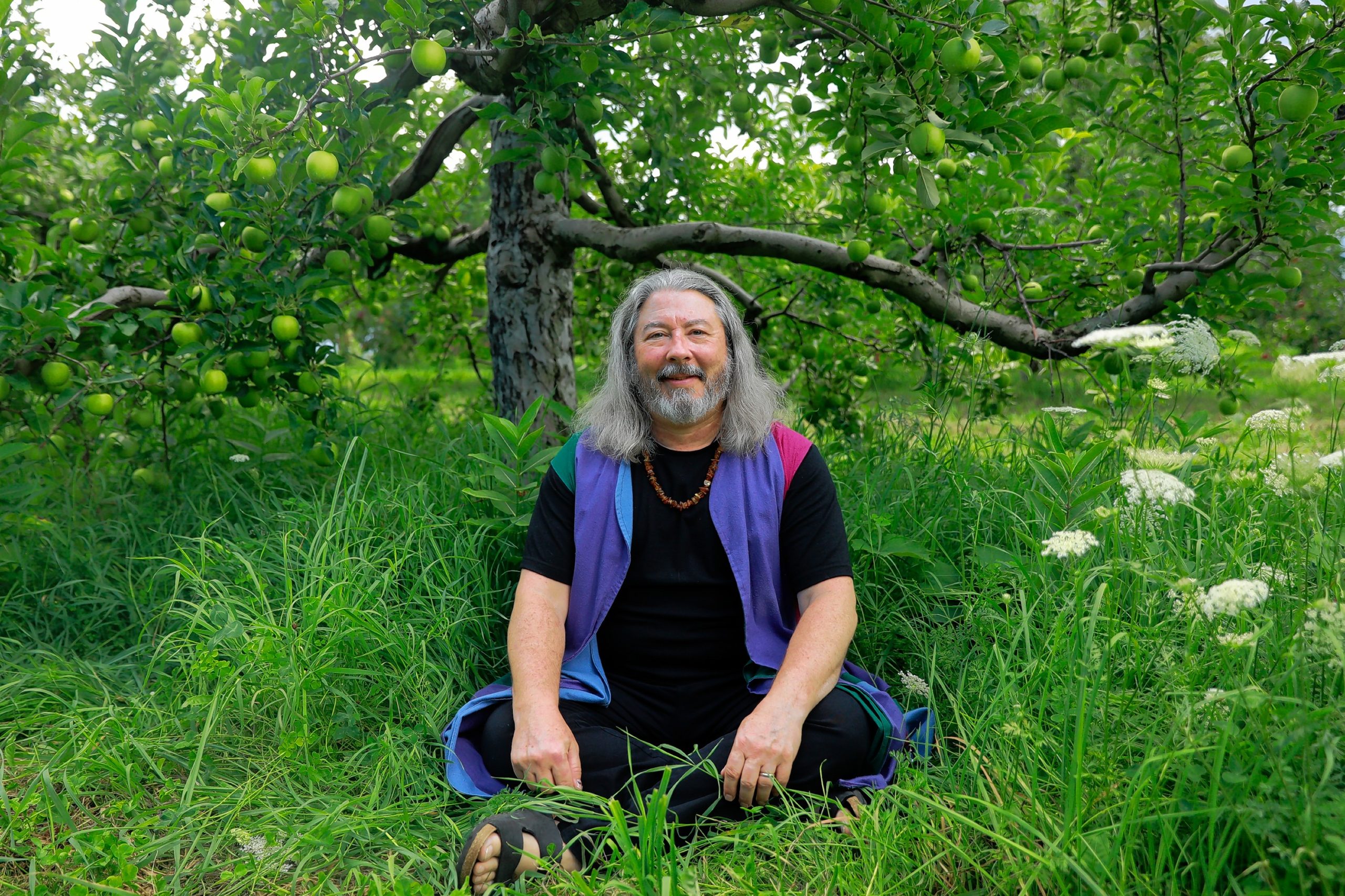
Rev. Christopher LaFond poses for a photo Tuesday afternoon among apple trees in Westhampton. STAFF PHOTO/DAN LITTLE
During the COVID-19 pandemic, the local organization switched from holding a food drive to raising money for charity. Last year, they raised $450 for the Northampton Survival Center and $600 the year prior to that.
Katie LaFond, who serves on the organizing committee for Western Massachusetts Pagan Pride Day, got involved with the annual event because she believed in the work that the group was doing in educating the public and dispelling misconceptions.
“I appreciated that they were being available to the public, so people could come and see what Pagans actually do,” she said.
This year’s event, which will be held from 10 a.m. to 6 p.m. on Saturday, Sept. 23 in the plaza at Kirkland Avenue where the Tuesday Farmers Market meets, will feature a number of workshops, musical entertainment, face-painting and a pumpkin ring-toss for kids, and numerous merchants.
Among those vendors who will attend this year’s Pagan Pride is healer, professional tarot reader and teacher, Winifred Costello of AwenTree; Bellingham-based metaphysical shop The Robin’s Nest; and internationally recognized psychic, holistic healer and teacher Sha Blackburn, who is also known as The LoonWitch.
The committee is also hosting its first-ever fashion show. Visitors are encouraged to show up sporting an ensemble they feel is befitting of a Pagan as long as it’s respectful.
Pagan Pride Day will also feature a segment Katie LaFond instituted a few years ago for visitors to come by and have a conversation with a person who identifies as a Pagan called, “Back Porch.”
Katie LaFond has identified a Pagan since she was a teenager. Though her mother was a Pagan, she says she tried really hard to rebel against it, but found it was the correct path for her.
“This allows people who are curious to come and talk to pagans because they’re there, they’re ready to talk,” she said. “If there’s a mother whose son says he’s marrying this woman who is a Pagan, she can come to Pagan Pride Day and learn what that means.”
The event’s location between the parking garage and the back of Thorne’s Marketplace also allows an element of anonymity, says Christopher LaFond. Prior to the pandemic, their previous location was at the Civic Center in Florence.
“Having the site downtown means people who are curious might feel a little bit safer just wandering through Pagan Pride Day. They can check things out without feeling exposed because there’s already a lot of foot traffic,” he said.
Organizers welcome people of all colors, genders and sexes, and of all beliefs or none to Pagan Pride Day. Though there is no admission fee, organizers encourage visitors to bring a cash donation to the Northampton Survival Center.
“We’re hoping people come away from the event with a smile on their face with the acknowledgment that there are so many beautiful, different ways to be human, and know that we’re all better for being different,” said Katie LaFond.

